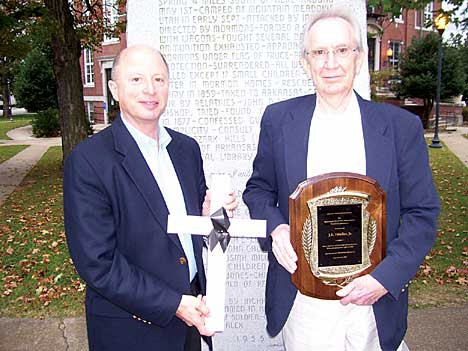0/23/2007
Fancher honored for reconciliation
By DAVID HOLSTED , Times Staff
davidh@commpub.com
J.K. Fancher Jr. recalled his reaction
upon hearing the news.

Staff Photo/David Holsted
J.K. Fancher Jr. (right) of Harrison poses with a Lifetime Achievement
Award presented to him by the Mountain Meadows Association Board of
Directors. It honors Fancher for his work in fostering reconciliation
between all parties involved in the 1857 incident in which 120 members
of a wagon train from Arkansas were murdered in Utah by Mormons.
Fancher's son, Terry, who is the president of the Mountain Meadows
Association, holds a cross from the 150th anniversary ceremony at the
Mountain Meadows site.
J.K. Fancher Jr. recalled his reaction upon hearing the news.
"Oh, my God, what have I done to deserve this?" he said.
While Fancher of Harrison might downplay his role, others have seen
how he has worked to bring about a reconciliation between all parties
that were involved in the infamous Mountain Meadows massacre of 1857.
On Sept. 8, at a dinner held in Utah, Fancher was awarded a Lifetime
Achievement Award by the Mountain Meadows Association Board of
Directors.
The dinner was part of a weekend schedule that commemorated the 150th
anniversary of the incident in which 120 members of a wagon train from
Arkansas were murdered by Mormons.
Also receiving a Lifetime Achievement Award was Gordon B. Hinckley,
the president of the Church of Jesus Christ of Latter Day Saints
(Mormons), for his commitment to the preservation of the massacre
site.
Because of his health, Fancher was unable to attend the dinner. Terry
Fancher, who serves as president of the Mountain Meadows Association,
accepted the award of behalf of his father. Terry Fancher said he was
able to put his cell phone next to the microphone at the dinner so his
father could follow the proceedings.
Terry Fancher, who lives in Boston, was in Harrison over the weekend
to present the plaque to his father. He also brought with him a cross
adorned with a black ribbon. It was one of 120 crosses that were part
of the ceremony at the massacre site.
The Fanchers are lateral descendants of Alexander Fancher, one of the
leaders of the wagon train. J.K. Fancher said he is related to 14
people, including two survivors, of the attack.
J.K. Fancher has been interested in the events of Mountain Meadows for
a number of years. He credited J.E. Dunlap, the late publisher of the
Daily Times, for his involvement also. Fancher said Dunlap
allowed him to write 17 articles about Mountain Meadows for the paper.
In his comments to the Mountain Meadows Association, which his son
read, J.K. Fancher stressed the need for healing between the
descendants of all those connected with the event. He summed up his
feelings by using a quote that he had memorized from a prayer book.
"Forgiveness opens the door to reconciliation. When we open that door,
others may choose not to walk through it, but regardless of their
decision, we ourselves remain free from the burden of hatred."
According to Terry Fancher, the weekend at Mountain Meadows had a
sense of reconciliation about it. At a gathering on Sept. 11 - the
150th anniversary of the massacre - Elder Henry B. Eyring, a member of
the LDS Quorum of the Twelve, made what J.K. Fancher said was the
closest to an apology from the LDS church.
"We express profound regret for the massacre carried out in this
valley 150 years ago today," Eyring said, "and for the undue and
untold suffering experienced by the victims then and by their
relatives to the present time."
Eyring was not just paying lip service, according to Terry Fancher.
"The guy was genuine," he said. "You have to have both sides at the
table to get something done."
The Mountain Meadows Association is one of three organizations, the
others being the Mountain Meadows Monument Foundation and the Mountain
Meadows Massacre Descendants, addressing the issues connected with the
massacre.
Terry Fancher said his organization is made up of both descendants of
the Fancher-Baker wagon train and members of the Mormon church. In the
next year or two, he said, all three organizations will be working on
a design for a suitable monument that will be placed at the northern
grave site, the spot where the victims - men, women and children -
were buried. That monument will join two others already in place at
Mountain Meadows, the others being on Dan Sill Hill, erected in 1990
by the State of Utah and overlooking the valley, and the monument at
the attack site and funded by the Mormon church.
"It's time to get our forces together for that northern grave site
monument," Terry Fancher said.
He went on to say that the Mountain Meadows Association's other main
goal is to protect the sanctity of the massacre site. He noted that
the meadows' higher elevation and its resulting cooler temperatures
have made the area attractive to people moving out from St. George,
Utah, 20 miles to the south.
"Our goal is to protect the valley from development," Terry Fancher
said.
J.K. Fancher said that many people don't realize that children, along
with adults, were killed in the massacre. The average age of the wagon
train party was 18 years, and that children as young as 10 were
murdered.
"When you hold the skull of a kid who was shot through the back of the
head," he said, "it makes it real." It was time to move on, though.
"We need to heal all these old bitter feelings and heal the wounds,"
J.K. Fancher said.